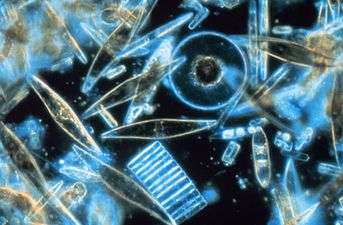Aurelia (cnidarian)
| Aurelia | |
|---|---|
| Adult Aurelia aurita medusa | |
| Scientific classification | |
| Kingdom: | Animalia |
| Phylum: | Cnidaria |
| Class: | Scyphozoa |
| Order: | Semaeostomeae |
| Family: | Ulmaridae |
| Genus: | Aurelia Lamarck, 1816 |
| Species | |
| |
.jpg)
Aurelia is a genus of scyphozoan jellyfish, commonly called moon jellies. There are at least 13 species in the genus Aurelia including many that are still not formally described.[1][2] It has been suggested that Aurelia is the best-studied group of gelatinous zooplankton, with Aurelia aurita the best-studied species in the genus; two other species, Aurelia labiata and Aurelia limbata have also been investigated (studies summarized by Arai[3]). Since most previous studies of Aurelia were done without the benefit of genetic identification, one cannot positively attribute the results of most research to the species named. Species of Aurelia can be found in the Atlantic Ocean, the Arctic Ocean and the Pacific Ocean, and are common to the waters off California, northern China, Japan, Korea, Australia, New Zealand, the Black Sea, Indonesia, the eastern coast of the United States as well as Europe.[2] Aurelia undergoes alternation of generations, whereby the sexually-reproducing pelagic medusa stage is either male or female, and the benthic polyp stage reproduces asexually. Meanwhile, life cycle reversal, in which polyps are formed directly from juvenile and sexually mature medusae or their fragments, was also observed in Aurelia sp.1.[4]
See also
References
- ↑ Dawson, Michael N (2003). "Macro-morphological variation among cryptic species of the moon jellyfish, Aurelia (Cnidaria: Scyphozoa)". Marine Biology. 143 (2): 369–379. doi:10.1007/s00227-003-1070-3.
- 1 2 Dawson, Michael N. "Aurelia species". Retrieved 2008-08-12.
- ↑ Arai, Mary Needler. A Functional Biology of Scyphozoa. London: Chapman and Hall. pp. 68–206.
- ↑ He; et al. (2015-12-21). "Life Cycle Reversal in Aurelia sp.1 (Cnidaria, Scyphozoa)". PLOS ONE. 10: e0145314. doi:10.1371/journal.pone.0145314. PMC 4687044. PMID 26690755. Retrieved 2015-12-31.
External links
| Wikimedia Commons has media related to Aurelia. |
